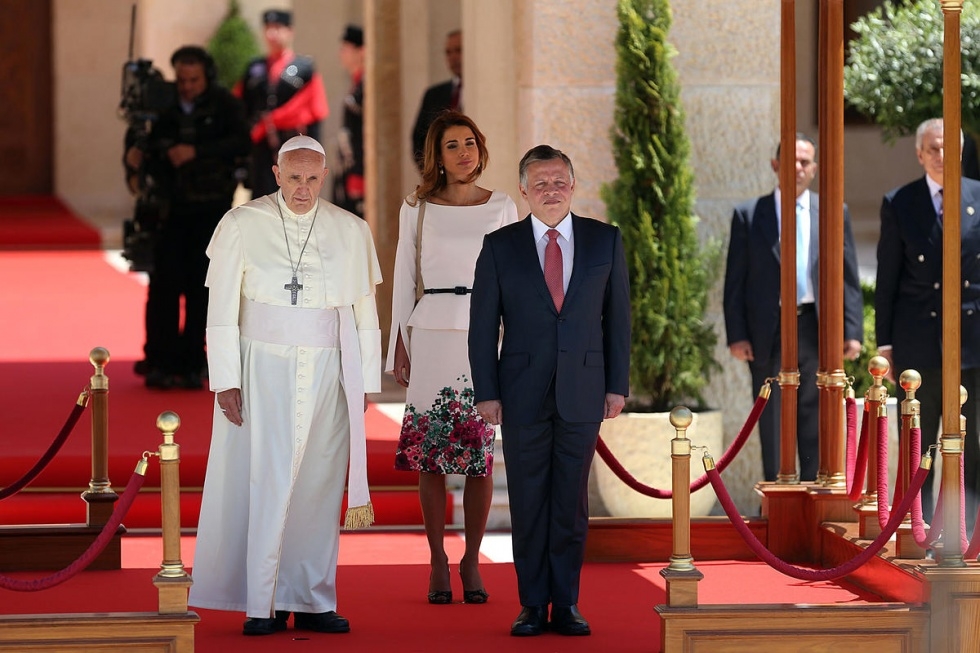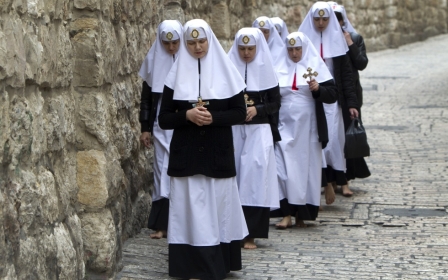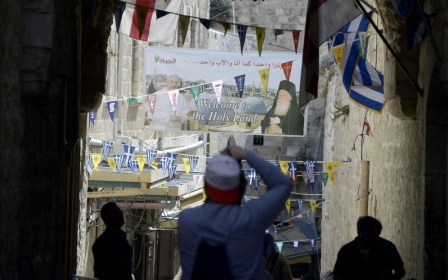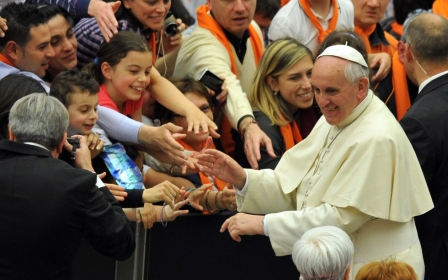Pope calls for return to Syria peace talks

Pope Francis called for an "urgent" end to the civil war in Syria announcing he will meet with Syrian refugees in Jordan, as he begins his first tour of the Middle East.
After receiving a rapturous welcome in Jordan, Francis praised the country's role in receiving over 600,000 refugees from Syria.
"I thank the authorities of the kingdom for all they are doing and I encourage them to persevere in their efforts to seek lasting peace for the entire region," he said. "This goal urgently requires that a peaceful solution be found to the crisis in Syria, as well as a just solution to the Israeli-Palestinian conflict."
Francis then headed to give mass at the international stadium in the capital Amman, where he spoke of the need to set aside grievances to achive peace and unity, in front of a crowd estimated to be more than 25,000.
"Peace isn't something which can be bought; it is a gift to be sought patiently and to be crafted through the actions, great and small, of our everyday lives," he said.
New MEE newsletter: Jerusalem Dispatch
Sign up to get the latest insights and analysis on Israel-Palestine, alongside Turkey Unpacked and other MEE newsletters
People who attended the mass were quick to post photos of the visit to social media sites.
Israeli authorities have moved to lessen the possibility of trouble by ordering 15 rightwing Jewish activists to stay away from places being visited by the pope, after a string of hate attacks on Christian sites.
"It will be a purely religious trip," the pope told pilgrims at his last general audience in St Peter's Square before the three-day visit to Jordan, the Palestinian territories and Israel.
Francis said the main reasons for the trip were to meet with the Orthodox Patriarch of Constantinople, Bartholomew I and "to pray for peace in that land, which has suffered so much".
A joint prayer service with Bartholomew Sunday in the Church of the Holy Sepulchre - venerated as the place of Jesus' crucifixion and resurrection - is seen by the Vatican as the highlight of the visit.
The meeting is fitting, given that Francis has made the ideal of unity of the Christian Churches, one of the priorities of his papacy.
The pontiff will also meet Muslim and Jewish leaders in Jerusalem.
Israeli President Shimon Peres, in an interview with French daily Le Figaro, said he attached "great importance" to the pope's trip, calling Francis "a man of noble humility."
"I don't think the visit is going to bring the signing of a peace deal tomorrow, or even the organisation of a conference, but I am sure that it will make a substantial contribution because the pope respects all cultures and all religions," he said.
The 77-year-old Argentine pope has already set the tone for a trip rich in symbolism by inviting two old friends from Buenos Aires to join him, Jewish Rabbi Abraham Skorka and Muslim professor Omar Abboud.
'Oasis of peace'
Francis is expected to touch on the forced migration of Christians from the Middle East.
"Because of the global popularity that Francis enjoys, if he comes to the Holy Land and says 'I have your back' it may mean something to Christians," John Allen, Vatican expert for the Boston Globe, told AFP.
Although only 250,000 Jordanians identify themselves as Christian - in a Muslim country of seven million - Prime Minister Abdullah Nsur said the visit would show the kingdom as an oasis of peace in a turbulent region of "blood, wars and repression."
Early Sunday, the pope will make a short helicopter ride to Bethlehem, the West Bank town where Jesus was born. He will meet Palestinian president Mahmoud Abbas before celebrating mass in Manger Square.
Afterwards he will chat with Palestinian children and lunch with refugee families.
He will then fly to Tel Aviv where he will be greeted by President Peres before heading to Jerusalem.
'Balanced'
On Monday, the pope will visit the Al-Aqsa Mosque compound and meet the Grand Mufti of Jerusalem Mohammed Hussein.
He will then visit the Western Wall, a remnant of the retaining wall that supported the second Jewish temple and the holiest site at which Jews are allowed to pray, before going to the Yad Vashem Holocaust memorial.
He is then set to meet Prime Minister Benjamin Netanyahu and celebrate mass in the Cenacle, where Christians believe Jesus held the Last Supper memorialised in the mass.
Rabbi Skorka said Francis would try to avoid political pitfalls in the sensitive region by dividing his visits equally among Jewish Israeli sites and Muslim or Christian landmarks in Palestinian territory.
"He will try to be balanced," Skorka told journalists in Jerusalem.
The Cenacle stop has inflamed the ultra-Orthodox and nationalists since Jews revere part of the building as the tomb of King David.
Middle East Eye delivers independent and unrivalled coverage and analysis of the Middle East, North Africa and beyond. To learn more about republishing this content and the associated fees, please fill out this form. More about MEE can be found here.




